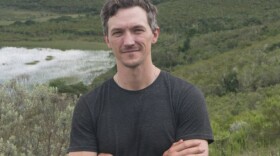
This Green Earth is a weekly, hour-long program that focuses on the environment and environmentalism. Co-hosts Christopher Cherniak and Claire Wiley explore the science, politics, economics and ethics behind the environment, natural resources and sustainability.

This Green Earth includes interviews with local and national experts in the fields of water resources, air quality, environmental policy, fossil and renewable fuels, climate, conservation, ecosystems, agriculture, aquaculture and sustainability.
Christopher Cherniak is an environmental engineer with nearly 30 years' experience as an environmental consultant. Claire Wiley is an award-winning broadcast journalist. Together, they direct This Green Earth's mission: to educate listeners about the importance of environmental preservation, conservation and stewardship.
This Green Earth is sponsored by:
For questions and inquiries, or to inquire about appearing on the show, contact the hosts directly at thisgreenearth@kpcw.org.
-
Learn more about the importance of biodynamic farming and "certified organic" labels in the wine industry
-
Heavy rains from December and January have brought endangered coho salmon into small tributaries on the San Geronimo Valley
-
Utah is the fastest-growing state in the nation, it's also the second driest state and has one of the country's highest per-capita water use. A recent article in the Salt Lake Tribune takes a deeper look into Utah's water policy.
-
Breaking down the Environmental Protection Agency's recent announcement regarding exposure to PFAS.
-
Bird enthusiasts listen up for some great winter birding tips
-
New global search effort to find several rare bird species that have been lost to science.
-
On the next This Green Earth, Claire & Chris speak with author Abrahm Lustgarten who writes about climate change and writes for New York Times Magazine, The Atlantic and PBS Frontline.In his forthcoming book, “On The Move,” Lustgarten explores how climate change is uprooting American lives and where people will go. Lustgarten’s recent reporting focuses on global migration, demographic change and conflict in response to a warming climate. Then, they speak with Alexa Friedman, an environmental epidemiologist interested in reducing exposure to harmful chemicals. Friedman will walk us through a recent study that talks about pesticides and produce.To end the show, Deeda Seed with the Center for Biological Diversity discusses the Endangered Species Act listing petition for Wilson’s phalaropes, and what it means for the Great Salt Lake's ecosystem.
-
Author and voice for the natural world, Carl Safina explores how humans are changing the living world and what the changes mean for the planet. His work has won a MacArthur “genius” grant as well as Pew and Guggenheim Fellowships.Then, Heal Utah’s Meisei [May-Say] Gonzalez details the 2024 legislative decisions the organization says will impact our state’s environmental health.
-
Professor of forest ecology at the University of British Columbia, Suzanne Simard, is at the forefront of plant communication and intelligence research. She explains why trees are vital to each other and to humans. (01:32)And, Utah Geologist Jeremiah Bernau discusses how the Bonneville Salt Flats have shifted over the years, with some of its most dramatic changes in recent decades. (25:50)
-
Professor Emeritus of Wildlife Science at the University of Washington, John Marzluff, discusses his highly acclaimed book “Gifts of the Crow: How Perception, Emotion, and Thought Allow Smart Birds to Behave Like Humans.”Then, Zach Frankel, Executive Director at the Utah Rivers Council shares his concerns about proposed laws on Utah’s Capitol Hill that he says will lead to development without public oversight or transparency. And Summit County Lands and Natural Resources Director Jess Kirby has updates on the 910 and Ure ranches.
-
Chris and Claire speak with John Vucetich, a professor of wildlife ecology at Michigan Tech. He is the author of a new book about wolves titled, "Restoring the Balance: What Wolves Tell Us About Our Relationship With Nature." Then, Colette Adkins, Carnivore Conservation Program Director and Senior Attorney at the Center for Biological Diversity, joins the show to talk about the fate of gray wolves in the northern Rocky Mountains after they were denied Endangered Species Act protection.








